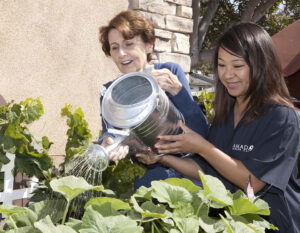As we age, it becomes increasingly important to prioritize our health and well-being. Aging can bring about unique challenges that require specialized attention and care. In recognition of this, May has been designated as National Geriatric Care Month, a time to shed light on the importance of comprehensive care for older adults. One valuable resource in the field of geriatric care is the Geriatric Care Manager (GCM), whose role and responsibilities revolve around supporting older adults in living safely and independently.
What is the Role of a Geriatric Care Manager in Senior Aging?
A Geriatric Care Manager is a professional who specializes in assisting older adults and their families in managing the complexities of aging. These individuals typically have backgrounds in social work, nursing, gerontology, or related fields. Geriatric Care Managers work collaboratively with older adults, their families, and other healthcare professionals to create personalized care plans that address specific needs, improve quality of life, and ensure safety.
families, and other healthcare professionals to create personalized care plans that address specific needs, improve quality of life, and ensure safety.
What are Some Responsibilities of a Geriatric Care Manager Working with Seniors?
Comprehensive Assessment: A GCM conducts a thorough evaluation of an older adult’s physical, emotional, and social well-being. They assess medical conditions, cognitive abilities, functional limitations, and social support systems to gain a holistic understanding of the individual’s needs.
Care Coordination: Geriatric Care Managers act as the central point of contact, coordinating care among various healthcare providers, such as doctors, therapists, and home health aides. They ensure effective communication and collaboration to prevent gaps or overlaps in care.
Personalized Care Planning: Based on the assessment, a GCM develops a customized care plan tailored to the unique requirements of the older adult. This plan may include recommendations for medical treatments, assistance with daily activities, housing options, financial planning, and end-of-life preferences.
Senior Advocacy: GCMs advocate for the rights and best interests of older adults. They ensure that the individual’s wishes are respected, assist with navigating complex healthcare systems, and help resolve conflicts that may arise within families or with healthcare providers.
Care Crisis Management: In times of emergency or unexpected health issues, Geriatric Care Managers are equipped to handle crises effectively. They can quickly mobilize resources, provide guidance, and support decision-making during challenging situations.
The Role of the Geriatric Care Manager in Supporting Safe and Independent Living
Home Safety Evaluation: GCMs assess an older adult’s living environment to identify potential hazards and recommend modifications to ensure safety. This may include installing grab bars, improving lighting, removing trip hazards, or suggesting assistive devices.
Caregiver Support and Education: GCMs provide guidance and education to family caregivers, empowering them with the knowledge and skills needed to care for their loved ones effectively. They offer emotional support, teach caregiving techniques, and connect caregivers with community resources.
Monitoring and Regular Check-Ins: GCMs maintain ongoing contact with older adults, monitoring their well-being and making adjustments to care plans as needed. Regular check-ins provide an opportunity to address emerging issues promptly and ensure that the older adult’s needs are consistently met.
Long-Term Care Planning: GCMs assist with navigating the complexities of long-term care options, such as assisted living facilities, nursing homes, or in-home care services. They help older adults and their families make informed decisions, considering factors such as cost, quality of care, and personal preferences.
How Can a Geriatric Care Manager Help You or a Senior Loved One?
If you or a loved one is an older adult, a Geriatric Care Manager can provide many benefits, including:
Improved safety and independence: GCMs can help identify potential safety hazards in the home and make recommendations for modifications or assistive devices to help older adults live safely and independently.
Better healthcare management: GCMs can help coordinate medical appointments, manage medications, and communicate with healthcare providers to ensure that older adults receive the best possible care.
Increased access to community resources: GCMs can connect older adults and their families with community resources, such as transportation services, meal delivery programs, and support groups.
Peace of mind for family members: GCMs can help alleviate the stress and burden of caregiving for family members, providing support and guidance throughout the aging process.
How Do You Know Whether You or Senior Loved One Need a Geriatric Care Manager?
If you are an older adult or have an aging loved one, a geriatric care manager can be a valuable resource. Here are some signs that you may benefit from working with a GCM:
- You are experiencing physical or cognitive changes that are affecting your ability to live independently.
- You are struggling to manage chronic conditions or medications.
- You are feeling overwhelmed by the complexity of the healthcare system.
- You are feeling isolated or lacking social support.
- You are a caregiver and are experiencing burnout or stress.
As family caregivers learn very quickly, caring for an aging loved one – albeit an honor and a privilege – will at times feel overwhelming, isolating and exhausting. Geriatric Care Managers bring their knowledge and organizational skills to help seniors and their families make the right choices. Like the senior care advisors at Amada Senior Care, GMCs play a crucial role in supporting older adults as they strive to live safely and independently. Their expertise in assessment, care coordination, advocacy, and crisis management alleviates the burden on families and ensures that older adults receive the personalized care they deserve. If you or a loved one is facing the challenges of aging, consider engaging a Geriatric Care Manager or for similar guidance, feel free to call us at Amada toll-free at 866-752-1961 or CLICK HERE to find an Amada office near you.
“Navigating Senior Aging: Do You Need a Geriatric Care Manager?,” written by Michelle Flores, Amada blog contributor.















